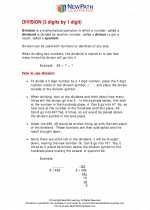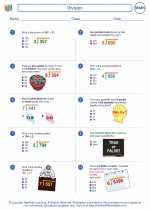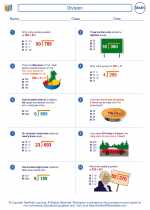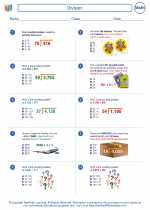Algebra Study Guide
What is Algebra?
Algebra is a branch of mathematics that uses symbols and letters to represent numbers and quantities in equations and formulas. It involves solving for unknown variables and manipulating mathematical expressions.
Key Concepts in Algebra
- Variables: In algebra, letters such as x, y, and z are used to represent unknown quantities or variables.
- Expressions: Algebraic expressions are combinations of numbers, variables, and operations such as addition, subtraction, multiplication, and division. For example, 3x + 5 is an algebraic expression.
- Equations: An equation is a mathematical statement that asserts the equality of two expressions. For example, 2x - 7 = 11 is an equation.
- Functions: In algebra, functions are relationships between input and output values, often represented using function notation, such as f(x) = 2x + 3.
- Linear Equations: Equations of the form y = mx + b, where m and b are constants, represent straight lines on a graph.
- Quadratic Equations: Equations of the form ax^2 + bx + c = 0, where a, b, and c are constants and a ≠ 0.
Algebraic Operations
Algebra involves several fundamental operations:
- Addition and Subtraction: Combining like terms and simplifying expressions involve adding and subtracting terms with similar variables.
- Multiplication and Division: Multiplying and dividing algebraic expressions involves applying the distributive property and simplifying terms.
- Solving Equations: Solving equations involves isolating the variable by performing inverse operations to both sides of the equation.
- Factoring: Factoring involves expressing algebraic expressions as products of simpler expressions.
Applications of Algebra
Algebra has numerous real-world applications, including in finance, physics, engineering, computer science, and many other fields. It is used to model and solve problems involving unknown quantities and relationships between variables.
Study Tips for Algebra
- Practice solving a variety of algebraic problems to strengthen your problem-solving skills.
- Understand the properties of operations and how they apply to algebraic expressions and equations.
- Master the fundamental algebraic manipulations, such as combining like terms, distributing, and factoring.
- Use graphing tools to visualize and understand the relationships represented by algebraic equations and functions.
- Seek help from teachers, tutors, or online resources if you encounter challenging concepts.
By understanding and applying the principles of algebra, you can develop strong analytical and problem-solving skills that are valuable in various academic and professional pursuits.
[Algebra] Related Worksheets and Study Guides:
.◂Math Worksheets and Study Guides Sixth Grade. Division
Study Guide Division
Division  Worksheet/Answer key
Worksheet/Answer key Division
Division  Worksheet/Answer key
Worksheet/Answer key Division
Division  Worksheet/Answer key
Worksheet/Answer key Division
Division 

 Worksheet/Answer key
Worksheet/Answer key
 Worksheet/Answer key
Worksheet/Answer key
 Worksheet/Answer key
Worksheet/Answer key

The resources above cover the following skills:
Connections to the Grade 6 Focal Points (NCTM)
Number and Operations: Students' work in dividing fractions shows them that they can express the result of dividing two whole numbers as a fraction (viewed as parts of a whole). Students then extend their work in grade 5 with division of whole numbers to give mixed number and decimal solutions to division problems with whole numbers. They recognize that ratio tables not only derive from rows in the multiplication table but also connect with equivalent fractions. Students distinguish multiplicative comparisons from additive comparisons.